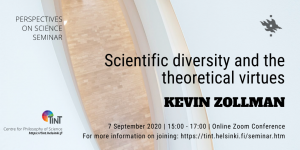
At the Perspectives on Science seminar on Monday 7.9. Kevin Zollman (Carnegie Mellon University) will give a presentation titled “Scientific diversity and the theoretical virtues”. The seminar will be organized as an online meeting in Zoom from 3-5 pm. Zoom is an online conference tool supported by University of Helsinki.
Perspectives on Science is a weekly research seminar which brings together experts from science studies and philosophy of science. It is organized by TINT, the Centre for Philosophy of Social Science at the University of Helsinki. More information about the seminar here.
To join the seminar please contact tatu.nuotio@helsinki.fi or kaisla.kareoja(a)helsinki.fi. Information about using Zoom can be found here.
Author bio:
Kevin Zollman is a professor in the Department of Philosophy and Social and Decision Sciences at Carnegie Mellon University. His research focuses on game theory, agent based modeling, and the philosophy of science. He has written papers on the evolution of language, social norms, the game theory of scientific practice, and ethics. Together with Paul Raeburn, he has also authored the book The Game Theorist’s Guide to Parenting.
Abstract:
Scientists evaluate theories according to many different dimensions of value. Philosophers debate how many and what they are, but it is clear that scientists care about several different aspects of a theory (like its simplicity, predictive accuracy, and the like). It has long been recognized that this diversity of evaluative criteria is one source of diversity in scientific pursuits. This paper explores, via computer simulation, how diversity of values affects scientific diversity and how it compares to other sources of diversity discussed in the literature. Ultimately, I conclude that diversity in values is one of the best mechanisms to sustain diverse perspectives in science. Almost paradoxically, I argue that even if there was a single correct virtue, the community would still benefit from there being disagreement about what makes a scientific theory good.
